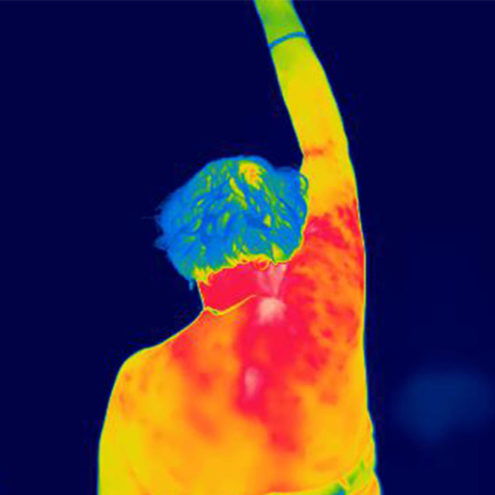Difference between Infection and Inflammation

Infection and inflammation are two different concepts often used in medicine. To understand the difference between infection and inflammation, it is important to know how they can affect the body and how they differ in their causes, symptoms and treatment.
What is an infection?
An infection occurs when the body is invaded by various infectious agents, i.e. micro-organisms, such as bacteria, viruses or fungi. These micro-organisms enter the body and multiply, leading to a disruption of the body’s normal functions. We can also become infected if microorganisms belonging to our own normal flora end up in the wrong place. Infections can affect different parts of the body, including the skin, respiratory, urinary and digestive tracts.
Causes of infections
Infections are caused by various infectious agents/microorganisms such as bacteria, fungi or viruses entering the body. The spread of the infectious agents can occur in several ways, such as direct contact, airborne droplets, contaminated food or drink, or insect bites. Streptococcus, influenza, candidiasis and are examples of common infectious diseases.
Symptoms of infections
The symptoms of an infection can vary depending on the organ or area affected. Common symptoms of an infection include fever, pain, swelling, redness, rash, nausea and fatigue. Specific symptoms may also occur depending on the type of infection, such as coughing in the case of respiratory infections or abdominal pain in the case of stomach infections.
Treatment of infections
The treatment of an infection depends on the type of microorganism causing the infectious disease as well as its severity. Usually, antibiotics are used to treat bacterial infections, while antiviral drugs are used to fight viral infections. Fungal infections can be treated with antifungal agents and parasitic infections may require specific anti-parasitic drugs. It is important to follow the doctor’s prescription and take the full course of antibiotics to ensure that the infection is treated effectively.
What is an inflammation?
Inflammation is the body’s natural response to injury, infection or irritation. It is a defense mechanism that aims to protect the body and speed up the healing process. Inflammation can occur in different parts of the body such as skin, joints, internal organs and tissues.
Causes of inflammation
Inflammation can be caused by various factors such as injuries, infections, autoimmune diseases or exposure to allergens. When the body perceives a threat or injury, the immune system is activated and releases inflammatory substances, such as cytokines and other chemical messengers. These substances increase blood flow to the injured area, which accumulates to repair the tissue damage. Along with the blood, white blood cells arrive at the injured area and fight off any infectious agents.
Symptoms of inflammation
The most common symptoms of inflammation are warmth, swelling, redness, pain and reduced function. If the inflammation is severe, fever may also occur. The symptoms of inflammation can vary depending on the area of the body affected and the degree of inflammation.
Treatment of inflammation
The treatment of inflammation aims to relieve the symptoms. There are different treatment approaches that can be used. These can be anti-inflammatory drugs, such as NSAIDs (non-steroidal anti-inflammatory drugs), corticosteroids and immunomodulatory drugs. Local treatments, such as cold or heat, can also be used to relieve symptoms and reduce inflammation in specific areas.
Comparison of infection and inflammation
Infection and inflammation are two related terms that describe two different conditions. An infection can cause inflammation as part of the body’s immune response. Inflammation can also occur as a reaction to injury or irritation, without the presence of an infection. Both conditions may be associated with common symptoms such as redness, swelling and pain, but it is important to distinguish them in order to provide proper treatment.
Common features
Both infection and inflammation involve the immune system’s response to a challenge or injury in the body. They can both result in symptoms such as redness, swelling and pain. In addition, both processes are part of the body’s natural healing mechanisms.
Key differences
The main difference is that an infection involves the body being attacked by harmful microorganisms, while inflammation can occur in response to injuries, autoimmune diseases, allergies but also to infections. Infections usually require specific treatment, while inflammation can be treated with anti-inflammatory drugs or topical treatments depending on the cause and symptoms.
How do infections and inflammation affect the body?
Both infections and inflammations can have a major impact on the body. During an infection, the immune system tries to fight and eliminate the harmful microorganisms. This can result in symptoms such as fever, fatigue, muscle aches and loss of appetite. Inflammation is part of the body’s healing process and aims to repair damaged tissue and fight any infection. It can result in localized or systemic symptoms depending on the extent of the inflammation and its impact on the body.
Physiological reactions
In inflammation, blood flow to the injured area increases to deliver nutrients and white blood cells that can fight the infection or repair the damage. This process can lead to fever and the production of specific antibodies to neutralize and eliminate the infection. At the same time, there may be swelling and increased fluid accumulation in the tissue.
Health risks and complications
Both infections and inflammations can lead to health risks and complications if not treated appropriately. Inadequate treatment of infections can result in them spreading to other parts of the body and developing into more serious diseases. Chronic inflammation can lead to damage to tissues and organs and increases the risk of diseases such as cardiovascular diseases, autoimmune diseases and cancer.
Infection and inflammation – frequently asked questions and answers
What is the difference between infection and inflammation?
Infection and inflammation are two different concepts in medicine. An infection occurs when harmful microorganisms invade the body and colonize, while inflammation is the body’s natural response to injury, infection or irritation.
Can an infection cause inflammation?
Yes, an infection can lead to inflammation as part of the body’s immune response to fight the infection.
Can inflammation cause infection?
Inflammation can create a favorable environment for the growth of microorganisms and thus increase the risk of infection. In addition, severe inflammation can affect the ability of the immune system to fight infections effectively.
How are infections and inflammations treated?
The treatment of infections and inflammations depends on their cause and severity. Infections can be treated with medicines such as antibiotics or antivirals, while inflammations can be managed with anti-inflammatory medicines, topical treatments and lifestyle changes.
How can I prevent infections and inflammations?
To prevent infections, it is important to follow good hygiene practices, such as regular hand washing, vaccinations and avoiding contact with infected people. To reduce the risk of inflammation, it is important to avoid injuries, manage stress, maintain a healthy lifestyle and avoid known irritants and allergens.
 Search
Search


































